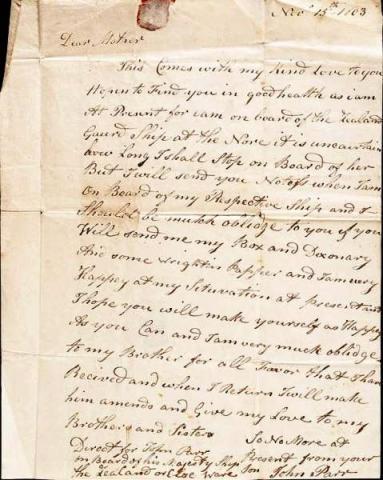18 Nov 2010
The letters of John Parr, an ordinary Jack Tar during the Napoleonic Wars.

From the documents, we know that Parr, of Church Lane off the Strand in London, was apprenticed to Thomas Parr, his brother and a copper plate printer, in January 1801. He was literate, so had received some education, although this may have been curtailed when he father died (his mother is described as 'Jane Parr widow') and his spelling is certainly idiosyncratic – he asks his mother to send on his 'dixonary' which he obviously had need for!
At some point in 1803, however, he was taken by a press gang and entered into the navy, writing to his mother in November 1803 from the guard ship Zealand at the Nore whilst waiting to be sent to his first ship. It is unclear if John had previous experience at sea, as press gangs were supposed to target sailors, to provide the Navy with experienced men to ease the manning problems that arose in each war.
He was certainly not happy in the navy, as the next letter to his brother, dated 14 January 1804, refers to 'that fatel(sic) job' which led to him being impressed.
In March 1804, he writes of his new ship, the Hero, having to cut short her cruise due to a lack of provisions: 'having no cheese nor butter on board having left Yarmouth in such a hurry, and we have now near 150 sick men on board and no room at the hospital'. He also refers to the 'ill-usage' that he receives from the ships' officers, although admits that this might be following 'my attempt to swim ashore'; presumably an attempt to run away.
Parr was to remain on the Hero for the next four years, before turning over into the Ville de Paris. However, the final letter in the collection, dated 23 September 1810, reveals that John had finally been able to come ashore, and was working in Southampton as a plate printer and corresponding with his brother Thomas, also still a printer, at the Bank of England.
Navy life grew on Parr: on board the Hero, Parr was part of Strachan’s fleet that rounded up the four survivors of the French fleet after Trafalgar in November 1805.
His letter to his mother after this action recalls how they made them strike to 'British valour' at a cost of ten killed and 34 wounded. Parr was also taken by the reception the fleet received when they returned to Plymouth with their prizes, being met by 'people on shore with loud huzzas and bands of marines playing Rule Britannia'. However, he retained a wish for peace, and the chance to regain his liberty, lamenting in a letter describing the Hero’s pursuit of Jerome Buonaparte to North America how disappointed they were having received intelligence of there being a General Peace.
Parr's letters home offer an insight into a young man's life at sea, and are full of requests for his family to keep in touch with him about their life at home. He regularly asks for money, to allow him to pay for receiving their mails – a reminder of the difficulties of keeping in touch in the age of sail, with the great distances that separated families.